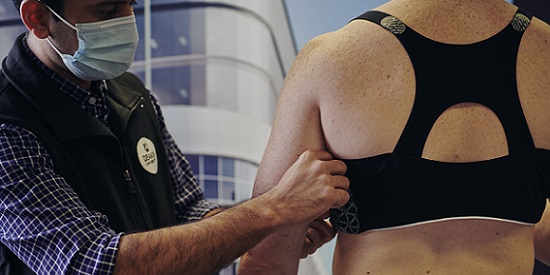World-first trial aims to build COVID-safe construction industry
Media release
Construction workers at two of Victoria's largest worksites have put a range of personal wearable temperature sensors to the test in a world-first trial that aims to boost the COVID-safe credentials of Australia's $360 billion construction industry.
The multi-disciplinary research team from Deakin University's Schools of Architecture and Built Environment and Information Technology placed and tested four different wearable sensors – an ear sensor, axillary sensor, vest, and the Oura ring – on 30 workers over three weeks in June and July.
The research team is being led jointly by Industry Professor Tony Arnel, President of the Energy Efficiency Council and the former Global Director of Sustainability at Norman Disney & Young, and Dr Farnad Nasirzadeh, Senior Lecturer in the School of Architecture and Built Environment.
Industry Professor Arnel said this unique research had the prospect of improving workplace health and safety and was an impressive collaboration between the building industry unions and the employers.
Dr Nasirzadeh, a leader in improving health and safety in construction workplaces, explained that the personal sensors provide more accurate data than the infrared thermometers currently being used to screen construction workers as they enter worksites.
"The infrared thermometers provide an unreliable detection of fever symptoms due to the variations in skin temperature throughout the day," Dr Nasirzadeh said.
"The personal sensors we've tested have been customised for construction workers to consider the effects of physical activities and ambient conditions on body temperature, in addition to the temperature fluctuations throughout the day.
"The sensors provide real-time temperature readings every minute, with the data validated by hospital-grade thermometers. The data is then shown on a custom-built advanced temperature monitoring dashboard which includes an alert system.
"The alert system is designed to then send a notification to the responsible person if an employee's temperature hits a specified threshold.”
Industry Professor Arnel said the team is about to begin analysing the data gathered at the two construction worksites.
"Thanks to financial support from Incolink, we've had 10 construction workers test the sensors so far while on the job at Kane Constructions' worksite at 60 Mooroobool Street in Geelong, the new home of GMHBA's headquarters," Industry Professor Arnel said.
"We've also had 20 workers put the sensors through their paces at the construction site of CSL's new global headquarters at 645 Elizabeth Street, which is being managed by Probuild.
"Once we've analysed the data to find the most accurate and comfortable option, we'll begin the project implementation phase, where the devices will be worn by a large number of construction workers across Victoria.
"Ultimately, we hope that the wearable technology will aid our understanding of the early signs of coronavirus in the next stage of the project and help Australia's construction industry keep moving forward as we all learn to live in a COVID-19 world."
Dr Chandan Karmakar, Senior Lecturer in Deakin's School of IT and one of the chief investigators for the trial, developed the data collection framework and temperature monitoring dashboard which links to the sensors.
"The advanced monitoring dashboard and alerting system that will be developed in the project implementation phase will not only detect symptoms of COVID in real time, but also will help to monitor the changes in conditions of infected workers while they are in isolation," Dr Karmakar said.
Erik Locke, Chief Executive Officer at Incolink, said the research is an excellent example of collaboration between builders, the building unions, workers and the university.
"Incolink is the safety net for the building and construction industry providing Australia's oldest, largest and most comprehensive worker's entitlement scheme," Mr Locke said.
"We have a strong focus on promoting health and well-being support to our members and we're pleased to partner with Deakin University to fund this ground-breaking research.
"Many other applications are possible with this type of technology which can improve health and safety outcomes for workers."

